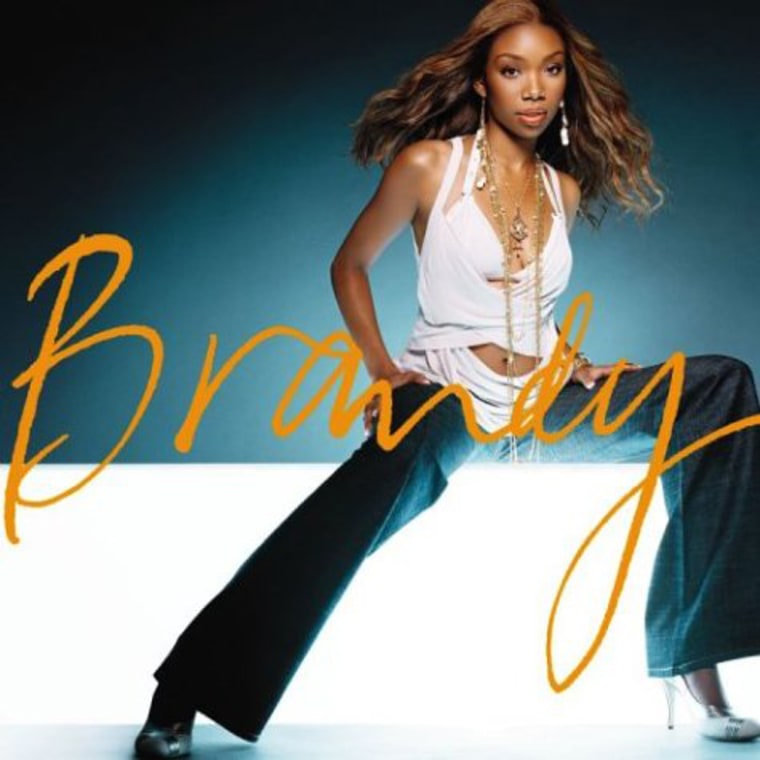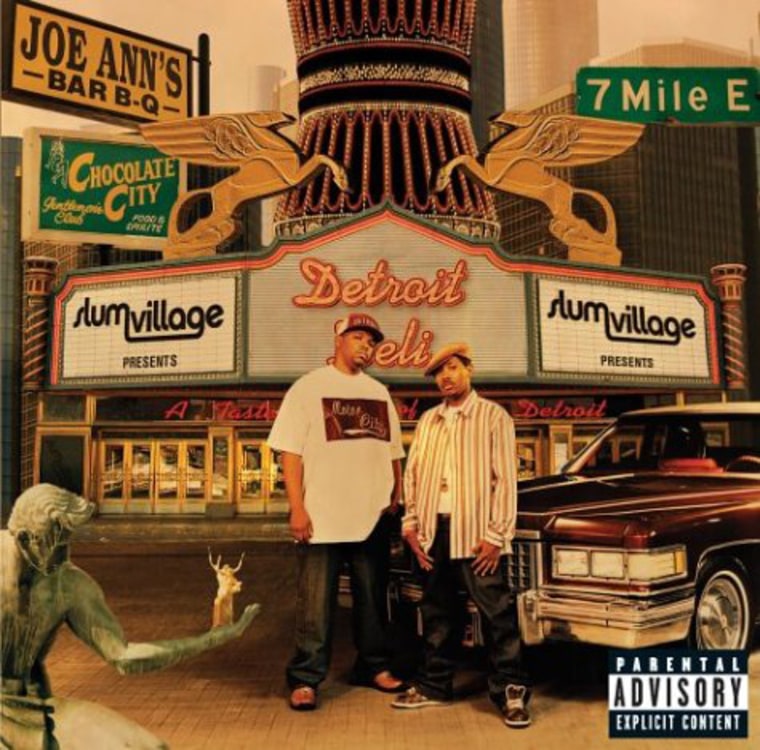Brandy takes listeners on an emotional journey on "Afrodisiac," G-Unit's Lloyd Banks flies solo on "The Hunger For More" and it's "Seventy Two & Sunny" for Uncle Kracker in this week's music reviews.
“Afrodisiac,” Brandy
Created in the aftermath of Brandy’s divorce, references to hurt, pain and mistakes pepper almost every song on “Afrodisiac,” the singer’s fourth album. And, other than the “tabloid expose-with music!” feel of first song “Who I Am,” Brandy has created a compelling narrative from her emotional turmoil.
Brandy dumped longtime producer Rodney Jerkins; this time around, Timbaland is Brandy’s chief collaborator. He accessorizes her vocals with his trademark combination of offbeat samples and sound effects. The results occasionally feel shopworn, but creations like “I Tried” are fresh and new, combining the thudding of Iron Maiden with forlorn Brandy’s attempts to overlook her man’s philandering.

The title track is a sexy carnival ride, while “Should I Go” borrows from Coldplay’s “Clocks,” as the singer ponders “should I go?/should I stay?” in her relationship and decides “I’m in control either way.
Brandy spends most of what is undoubtedly her best album celebrating newfound independence. The singer truly breaks free on first single “Talk About Our Love,” a partnering with rapper/producer Kanye West. With its blossoming chorus, this song wins the prize for most likely to blare from car stereos all summer long.— Rachel Kipp
“The Hunger For More,” Lloyd Banks
On Lloyd Banks’ solo debut, “The Hunger For More,” it’s clear that cronyism has its benefits and drawbacks. As the first foot soldier in 50 Cent’s G-Unit camp to spin-off on his own, Banks is virtually assured of moving major units. His homie already unlocked the multiplatinum gates.
Yet unlike 50 who, boasted a death-defying back story, new best friends Dr. Dre and Eminem, and bad boy appeal, Banks perhaps only knows by association what it feels like to be America’s favorite thug. On “The Hunger ...,” he seems to strike some of the same notes that made 50 a star — melodic hooks, slick beats and his own mumbled monotone delivery.
But where 50 offers humor, a smirking arrogance and an anti-hero’s jaded worldview, Banks rarely extends himself beyond mildly menacing guntalk and cocky punchlines. On the keyboard-driven, “If You So Gangsta,” he covers both bases, rhyming he’s got “pistols as long as the hand Shaq dunkin’ with” and adding, “I’m modelin’ diamonds now/ you can call me Ice & Beckford.”
Finally on the last track “Southside Story,” when Banks reveals the horror he felt when he saw his first shooting death, does any vulnerability surface. Otherwise, besides the undeniably funky Eminem-produced club smash, “On Fire,” and the R&B propelled ghetto love ditty “Karma,” it’s difficult to distinguish the uniqueness of the other tracks — musically or lyrically.
Don’t blame Banks for taking his mentors shtick and running with it. He’s just satiating rap fans actual hunger for more 50 Cent.
“Seventy Two & Sunny,” Uncle Kracker“There will be songs about me, there’ll be songs about you/there’ll be songs about everything from money to booze/but there won’t be no songs of regret,” boasts Uncle Kracker on the laid-back, gritty barroom anthem, “Songs About Me, Songs About You,” off his third solo outing, “Seventy Two & Sunny.”

With those words, Kid Rock’s DJ and close friend makes his aims clear before taking hold of the reins for this country-rock record.
The sunny, Sugar Ray-like pop track, “What Do We Want” is promising and catchy, yet it quickly gets lost in translation across the Mason-Dixon line. And Uncle Kracker’s earnestness gets tangled up in a tumbleweed pile-up of repetitive lyrics on the song, “Some Things You Cant Take Back,” where he seems to be straining to find himself vocally amidst the pedal steel guitar and crumpled beer cans.
Yet on the upbeat opener, “This Time,” Uncle Kracker’s twang and swagger are veritably down-home country and on “Blues Man” he could pass for a real seasoned crooner. Uncle Kracker’s voice effortlessly finds its way home when he duets with Kenny Chesney on the slow-burning, lovelorn ballad, “Last Night Again.”— Kerry L. Smith
“The Carter,” Lil Wayne
Lil Wayne is a lyrical rap pro, no doubt about it. But his solo album “The Carter” is simply rehashed street swagger and has little of the ingenuity from his recordings with the Big Tymers crew.
Lil Wayne leaves you wanting something with rougher edges and saltier rhymes that his Cash Money Millionaire cohorts are best known for.
Some of his rap buddies drop in on several hot tracks, including Mannie Fresh on “Bring It Back” and Baby on “Get Down.”
But this album falls prey to some hit-and-miss remixing.
Songs that beg for more energy, like “I Miss My Dawgs” featuring Reel, end up too subdued and subtle in contrast to Lil Wayne’s sparkling voice. It feels as though most of the beats and melodies were crafted in a studio months before Lil Wayne even began to think about crafting a song or album around them. Stock and disappointing stuff.
On other tracks like “BM J.R.,” Lil Wayne sounds like he’s whispering when he raps about hollow-point bullets destined for street foes. It’s as though he sneaked into a recording studio when no one was looking and tried to record the track on the sly by keeping his voice down.
Lil Wayne is better than this and with another team of studio pros “The Carter” might have fared better. As it stands, it’s forgettable stuff.— Ron Harris
“Detroit Deli (A Taste of Detroit)," Slum Village
For “Detroit Deli (A Taste of Detroit)” even to see the light of day is testament to Slum Village’s remarkable resolve. The Motown underdogs have endured typical record biz hassles: bootleggers, indie label trouble and poor promotion.

When two of the three founding members jumped ship after successive releases, SV’s future seemed bleak. In-house producer Jay Dee bolted for solo fortunes after their acclaimed 1999 debut, “Fantastic Vol. 2.” Then turbaned MC Baatin bailed following “Trinity,” a rambling 2002 effort that included the minor hit, “Tainted.” Less resilient groups would have quit.
Now down to one original member, rapper T3, and rhyme partner Elzhi, who replaced Jay Dee, the duo has produced an entertaining mix of radio-ready hits and atmospheric grooves.
Tapping new jack soulman John Legend and the prolific Kanye West for the girl-crazy first single, “Selfish,” has indeed raised Slum’s profile. Elsewhere, the disc boasts a variety of sonic styles from the synth-driven “Dirty” with Wu-Tang Clan’s Dirt McGirt (formerly known as ODB) to the funk-laced “Do You” with MC Breed to the dancehall bounce of “Closer” featuring Dwele’s hush-toned crooning.
This time, T3 and Elzhi balance their improved flows and ladies man rhymes with uplifting odes to single motherhood (“Old Girl/Shining Star”) and ghetto survival (“Keep Holding On”).
And on the confessional “Reunion,” with Jay Dee on the beat and rhymes, the group reconciles their rocky evolution. With “Detroit Deli,” it’s apparent the drama has only made Slum Village stronger.— Brett Johnson
“Revelation,” Joe Nichols
Joe Nichols delivers thought-provoking lyrics in his rich baritone on his new album “Revelation.”
As with his first album, “Man with a Memory,” the 11-track CD is dominated by ballads, which suit Nichols’ style, although he has a rollicking good time with the two upbeat tunes. In “What’s a Guy Gotta Do,” lamenting the difficulty of landing a date, he sings, “Had an old man tell me, ‘Boy, if you were smart/You’d hit the produce aisle at the Super Wal-Mart’/So I bumped into a pretty girl’s shoppin’ cart/But all I did was break her eggs and bruise her artichoke hearts.”
Contrast that with “Singer in a Band,” which compares what he does for a child recovering from cancer, a single mother working overtime or a soldier in a minefield.
The first single from the album, “If Nobody Believed in You,” already in Billboard’s top 25 country songs, reflects on the anguish of a young baseball player who’s berated by his father and the old man whose son takes away his car keys.
“Farewell Party,” a remake of the Gene Watson hit, is just pure old-time country — weepy fiddle, whining pedal steel and all.
Nichols’ first album, also rich in story songs, went gold and produced four hits, including the No. 1 country tune “Brokenheartsville.”
If anything, “Revelation” is better — possibly because Nichols’ initial success gave him access to better material on his sophomore outing, or perhaps reflecting even more confidence in making his selections.— Tom Gardner
“Tristan und Isolde,” Various Artists
The stickers attached to the CD boxes on sale at Tower Records proclaim: “Deborah Voigt’s Role Debut as Isolde,” and that pretty much says it all about this new recording of Wagner’s epic love story, “Tristan und Isolde.”
The acclaimed American soprano — yes, the same one deemed too fat to appear at Covent Garden in a revival of Strauss’ “Ariadne auf Naxos” — is captured in a performance recorded live in Vienna, where she sang her first Isoldes a year ago.
It was a triumphant debut (though the production itself was savaged by audiences and critics alike) and immediately established Voigt as one of the few current singers capable of doing vocal justice to the role. It’s a triumph she’ll repeat in a few seasons at the Metropolitan Opera, where her partner will be Ben Heppner, the world’s leading heldentenor.
Voigt is in command throughout the nearly four hour-long performance. She brings a melting tone to the gentle passage that opens Act 2, nails the high C’s in the love duet that follows, and soars above the orchestra in the climactic “Liebestod” (though her last note, ending the phrase “hoechste Lust” or “supreme bliss,” is ever-so-slightly off the mark.) Her Act 1 showpiece, the “Narrative and Curse,” is impressive, but there’s room for more contrast between her tender memories of first encountering Tristan and fury over his betrayal.
Thomas Moser copes well in the first two acts but sounds fatigued by the time he gets to Act 3, which is dominated by Tristan’s long, morbid soliloquies. Petra Lang is strong as Brangaene, Isolde’s watchful companion, and Peter Weber makes a hearty sidekick to Tristan as Kurwenal. Robert Holl’s voice sounds somewhat frayed in his big solo as the cuckolded King Marke.
The Orchestra of the Vienna State Opera, conducted by Christian Thielemann, gives an inspired performance under Thielemann’s leadership. But the sound quality is uneven, as singers come in and out of focus a bit depending on their position on stage.— Mike Silverman
“Reflections,” Miriam Makeba
On “Reflections,” Miriam Makeba sings new versions of songs she sang in her five-decade long career. The South African singer has the sound of an elder woman, which works wonderfully well with some songs, though her voice shows its age in others.
Makeba’s tone has less growl and more crackle. It’s less commanding and more endearing. On ballads like “Where Are You Going?” which she first recorded in the ’60s, Makeba’s matured voice sounds like a grandmother offering advice while still conveying a beguiling sultriness in “Love Tastes Like Strawberries.” But her high notes are barely there on “Comme Une Symphonie D’Amour,” which she first sang in the ’80s, and “I’m In Love With Spring,” first released in 1965, also seems to stretch her range.
Makeba sings in a wide selection of languages on the album, sounding as natural in Spanish as French, and with the exception of some outdated string arrangements, her band is tight, with a standout flute solo by Kelly Petlane on “Xica Da Silva”. She includes the requisite “Pata Pata” and “Click Song,” along with a joyful version of “I Shall Sing” by Van Morrison.
Nonetheless, there’s something about hearing the age in her voice. And there’s something about the way the opening song “Iyaguduza” ends by melting into a reverie of strings, while the closing song ends with the phrase “so rest a while lonely soul” that makes “Reflections” sound like a long goodbye from Mama Africa. Cherish every moment of it.— Aimee Maude Sims